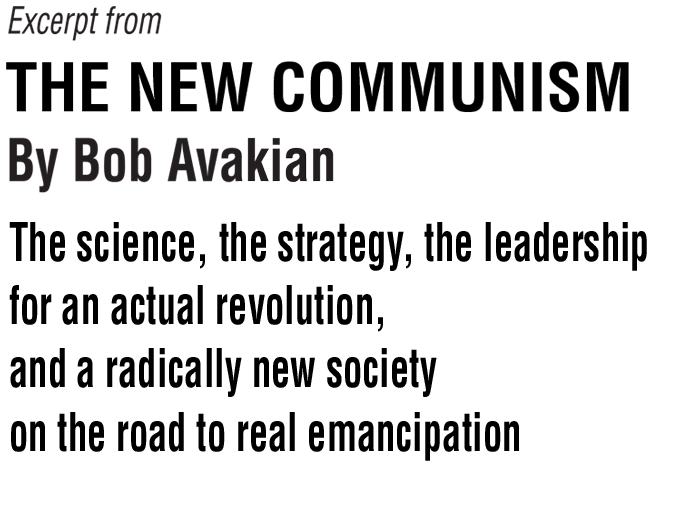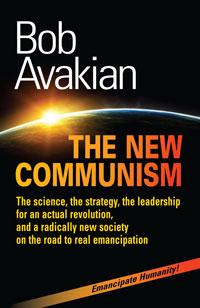
The following is an excerpt from the work by Bob Avakian, The New Communism. In addition to this and other excerpts posted on revcom.us, we will be running further excerpts from time to time on revcom.us. These excerpts should serve as encouragement and inspiration for people to get into the work as a whole, which is available as a book from Insight Press and as a PDF online at revcom.us.


This excerpt comes from the section titled "I. Method and Approach, Communism as a Science."
Also akin to this is what I call a “consumerist” approach to ideas. It’s not an approach of saying, “Do ideas actually correspond to reality?”—but, rather, “Do I like them?” It’s like you’re shopping for shoes or going to a movie. “Do I like this, or do I not like this?” I read a report where a copy of the film of the Dialogue with Cornel West was sent to someone who’s an intellectual, and they wrote back and said, “Well, you know, there’s a little too much passion in this for my taste.” I mean, we could spend the rest of our time here (and a long time beyond) talking about what’s wrong with that. First of all, it was pointed out to this person: This is not really a matter of taste—people are talking about what’s happening to real people in the real world. And it was also pointed out: Your taste, by the way, can change, it can change based on what you understand. This is something we really have to struggle with people about, because you run into this all the time. Here again is epistemology and morality. People find a way to dismiss things that make them uncomfortable, by acting like a consumer. And we have to challenge not only the particularity of what’s wrong with the way they respond to a specific thing, but the whole methodology and the whole approach. We have to tell them: “Look, I’m sorry, but that’s not an acceptable way to go through the world, that’s not an acceptable way to approach life, to decide whether something’s to your taste or not. And, frankly, it’s rather parasitic, too. You have the privilege to sit there and decide on a basis like that. People who are being shot down in the street, or people whose kids are starving, don’t have the luxury of deciding on that basis. They may have all kinds of wrong ideas, but they don’t have the luxury of deciding whether basic things about reality are to their taste or not.”
Now it’s not that we should jack people up—“you petit bourgeois asshole,” or whatever—but we should be struggling with people. This is not an acceptable way to approach life and to approach ideas. Is it true, or not true? If it’s true, it should be to your taste—or, if it’s not to your taste, you should change it. If there’s something about reality that you find distasteful, then you should go about changing that reality—and we’ll argue with you, too, about whether you should find it distasteful or not, if we don’t agree. But that’s the question: Is it true or not, and then what do you do about it? We have to struggle with people, straight up, that this is the way you have to approach the world.
“Who are you to say that this is the way we have to approach the world?” Well, we can struggle about that, too. It’s like what’s said in Birds and Crocodiles [Birds Cannot Give Birth to Crocodiles, But Humanity Can Soar Beyond the Horizon29]: “Who are you to say?” is the wrong question here. It’s not “who are we?”—the question is what is the reality. What is the way to understand and engage with reality and change reality? That’s the question, not who are you or who are we.
29. Bob Avakian, Birds Cannot Give Birth to Crocodiles, But Humanity Can Soar Beyond the Horizon. From a talk given in 2010. Available as an eBook from insight-press.com. Also available at revcom.us.[ return ]
Contents
Publisher's Note
Introduction and Orientation
Foolish Victims of Deceit, and Self-Deceit
Part I. Method and Approach, Communism as a Science
Materialism vs. Idealism
Dialectical Materialism
Through Which Mode of Production
The Basic Contradictions and Dynamics of Capitalism
The New Synthesis of Communism
The Basis for Revolution
Epistemology and Morality, Objective Truth and Relativist Nonsense
Self and a “Consumerist” Approach to Ideas
What Is Your Life Going to Be About?—Raising People’s SightsPart II. Socialism and the Advance to Communism:
A Radically Different Way the World Could Be, A Road to Real EmancipationThe “4 Alls”
Beyond the Narrow Horizon of Bourgeois Right
Socialism as an Economic System and a Political System—And a Transition to Communism
Internationalism
Abundance, Revolution, and the Advance to Communism—A Dialectical Materialist Understanding
The Importance of the “Parachute Point”—Even Now, and Even More With An Actual Revolution
The Constitution for the New Socialist Republic in North America—
Solid Core with a Lot of Elasticity on the Basis of the Solid Core
Emancipators of HumanityPart III. The Strategic Approach to An Actual Revolution
One Overall Strategic Approach
Hastening While Awaiting
Forces For Revolution
Separation of the Communist Movement from the Labor Movement, Driving Forces for Revolution
National Liberation and Proletarian Revolution
The Strategic Importance of the Struggle for the Emancipation of Women
The United Front under the Leadership of the Proletariat
Youth, Students and the Intelligentsia
Struggling Against Petit Bourgeois Modes of Thinking, While Maintaining the Correct Strategic Orientation
The “Two Maximizings”
The “5 Stops”
The Two Mainstays
Returning to "On the Possibility of Revolution"
Internationalism—Revolutionary Defeatism
Internationalism and an International Dimension
Internationalism—Bringing Forward Another Way
Popularizing the Strategy
Fundamental OrientationPart IV. The Leadership We Need
The Decisive Role of Leadership
A Leading Core of Intellectuals—and the Contradictions Bound Up with This
Another Kind of “Pyramid”
The Cultural Revolution Within the RCP
The Need for Communists to Be Communists
A Fundamentally Antagonistic Relation—and the Crucial Implications of That
Strengthening the Party—Qualitatively as well as Quantitatively
Forms of Revolutionary Organization, and the “Ohio”
Statesmen, and Strategic Commanders
Methods of Leadership, the Science and the “Art” of Leadership
Working Back from “On the Possibility”—
Another Application of “Solid Core with a Lot of Elasticity on the Basis of the Solid Core”Appendix 1:
The New Synthesis of Communism:
Fundamental Orientation, Method and Approach,
and Core Elements—An Outline
by Bob AvakianAppendix 2:
Framework and Guidelines for Study and DiscussionNotes
Selected List of Works Cited
About the Author